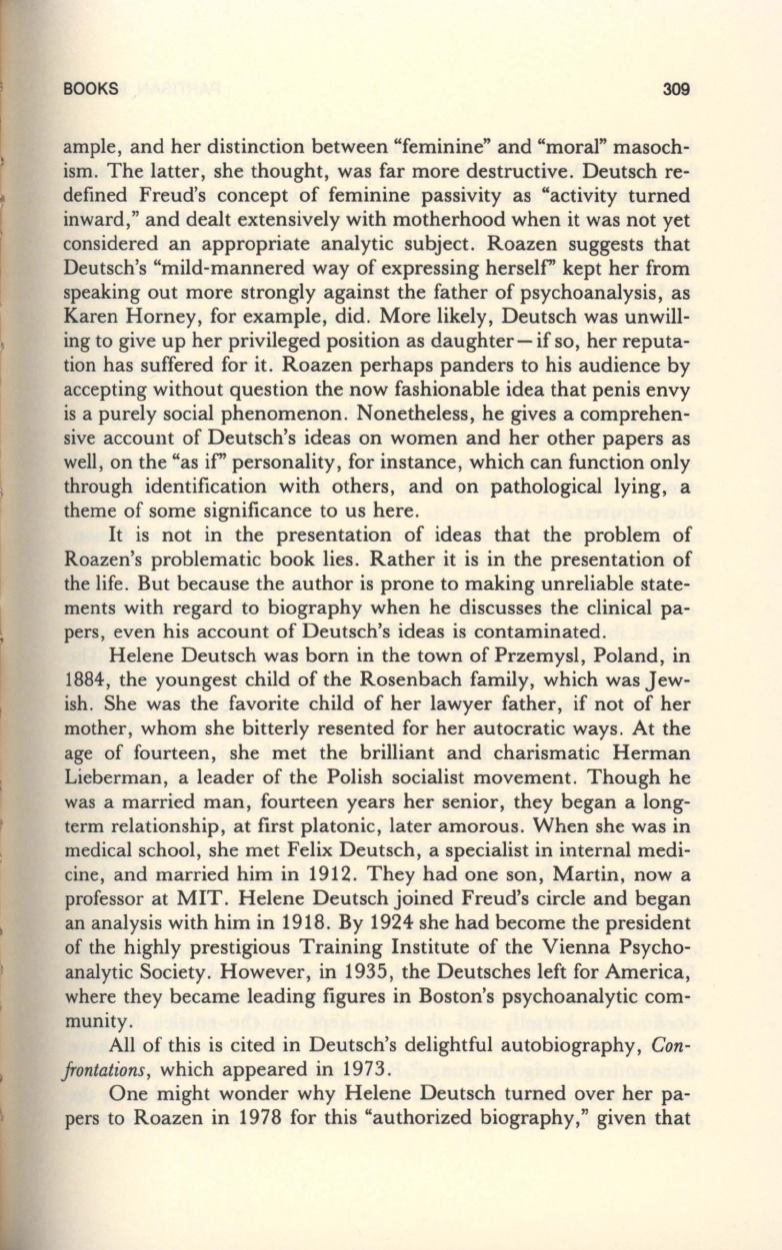
BOOKS
309
ample, and her distinction between "feminine" and "moral" masoch–
ism. The latter, she thought, was far more destructive. Deutsch re–
defined Freud's concept of feminine passivity as "activity turned
inward," and dealt extensively with motherhood when it was not yet
considered an appropriate analytic subject. Roazen suggests that
Deutsch's "mild-mannered way of expressing herself" kept her from
speaking out more strongly against the father of psychoanalysis, as
Karen Horney, for example, did. More likely, Deutsch was unwill–
ing to give up her privileged position as daughter- if so, her reputa–
tion has suffered for it. Roazen perhaps panders to his audience by
accepting without question the now fashionable idea that penis envy
is a purely social phenomenon. Nonetheless, he gives a comprehen–
sive account of Deutsch's ideas on women and her other papers as
well, on the "as if" personality, for instance, which can function only
through identification with others, and on pathological lying, a
theme of some significance to us here.
It
is not in the presentation of ideas that the problem of
Roazen's problematic book lies . Rather it is in the presentation of
the life. But because the author is prone to making unreliable state–
ments with regard to biography when he discusses the clinical pa–
pers, even his account of Deutsch's ideas is contaminated.
Helene Deutsch was born in the town of Przemysl, Poland, in
1884, the youngest child of the Rosenbach family, which was Jew–
ish. She was the favorite child of her lawyer father, if not of her
mother, whom she bitterly resented for her autocratic ways. At the
age of fourteen, she met the brilliant and charismatic Herman
Lieberman, a leader of the Polish socialist movement. Though he
was a married man, fourteen years her senior, they began a long–
term relationship, at first platonic, later amorous. When she was in
medical school, she met Felix Deutsch, a specialist in internal medi–
cine, and married him in 1912 . They had one son, Martin, now a
professor at MIT. Helene Deutsch joined Freud's circle and began
an analysis with him in 1918. By 1924 she had become the president
of the highly prestigious Training Institute of the Vienna Psycho–
analytic Society. However, in 1935, the Deutsches left for America,
where they became leading figures in Boston's psychoanalytic com–
munity .
All of this is cited in Deutsch's delightful autobiography,
Con–
frontations ,
which appeared in 1973.
One might wonder why Helene Deutsch turned over her pa–
pers to Roazen in 1978 for this "authorized biography," given that


